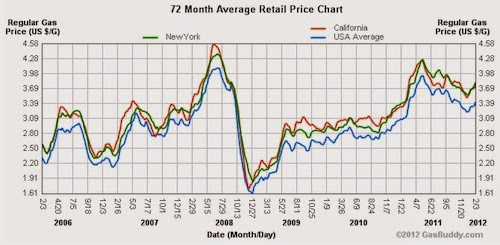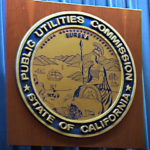The price of gasoline can affect the outcome of the 2012 elections, the success or failure of alternatively fueled vehicles like electric cars, and the success or failure of efforts to mitigate climate change and other environmental goals.
What should the price for gasoline be? That’s a huge question with major political, economic and environmental consequences. Some complain about the high price of gasoline and look to expanding oil drilling to bring the price down. Some see the subsidies given to oil companies, and wonder why this happens when the oil companies are immensely profitable. Some see the environmental cost for refining and burning oil, and to incentivize alternatives call for even higher gasoline prices. Some see the immense oil imports and the economic cost of selling dollars to buy oil, and also call for alternatives to oil. Some see the Middle East wars as being an externalized cost to the price of gasoline, see it as about gaining control over oil supplies, and also call for alternatives to oil.
Relative to many other countries the U.S. gasoline price is cheap. That’s in part due to U.S. domestic oil production, an advantage many countries do not have. However the U.S. oil reserves are scant compared to what they once were, we’ve already burned most it. In the present day, gasoline price goes up and down based on geopolitical whims and the number of operating oil refineries on any given week. However over the long term the cost of oil is destined to continue increasing. This is due to a supply effect known as “peak oil” which is an estimation of oil supply constraints which will occur as oil becomes harder to extract.
Even though the U.S. gasoline price is cheap compared to other countries, the perception is that it’s expensive. Perhaps because gasoline prices are higher than in the 80’s or 90’s.
Largely speaking the gasoline price is set by the market forces of supply and demand. The government has little power to control the price for gasoline, except for the gasoline tax. The last time the U.S. gasoline tax was raised was in 1993, and it is not pegged to inflation or the current price of gasoline.
Some say the gasoline price is too high and should be lowered. There is a strong correlation between high oil prices and recessions, and the recent bout of recession was immediately preceded by very high world-wide oil prices. Before the financial collapse in Sept 2008, we were complaining about gasoline prices in the spring and summer of 2008. But what ability does the government have to control oil prices? Very little. There is the Strategic Petroleum Reserves, but it’s purpose is not for the government to do market manipulation. Instead its purpose is to provide oil supplies in times of serious strategic need. For example, in June during the Libyan crisis there was a coordinated release of oil from oil reserves, to calm oil markets, and this caused controversy in some circles. Some in politics are calling for an increase in oil drilling, but since it takes 10 years or more for an oil well to come on line that won’t cause an immediate oil price decrease. And in any case, because the U.S. has only 2% of the world oil reserves the remaining U.S. oil reserves will do very little to power the U.S. economy for any length of time.
What about the oil company subsidies? Is this the correct allocation of dollars, to subsidize an immensely profitable industry? Some say the oil company subsidies are one of many factors tilting the market to the oil companies benefit. During his State of the Union Address last week President Obama said “We’ve subsidized oil companies for a century. That’s long enough. It’s time to end the taxpayer giveaways to an industry that rarely has been more profitable, and double-down on a clean energy industry that never has been more promising. Pass clean energy tax credits. Create these jobs.”
Some see various problems with the use of oil, and want to raise the gasoline price to disencentivize its use and encourage alternatives. One problem is the economic damage to the U.S. coming from importing so much oil and shipping dollars to oil producing countries. Additionally there are a range of environmental, health and climate issues caused by the use of oil. Together these create a strong incentive to switch away from using Oil, but not an incentive that’s reflected in the price of oil. The oil companies have made sure that many of the costs arising from using oil are not reflected in the price of gasoline.
Economists call those costs externalities, or a cost that’s paid by someone else and is not covered by the cost of the product. For example, are the costs of poisoning the places near oil wells or oil refineries reflected in the pump price of gasoline? The health care costs of those unfortunate enough to live near where crude
oil is mined or processed is not paid for by the oil companies, but by other means if at all.
The cost of the Iraq War can be seen as an externality to the price of gasoline, if you are one who believes the Iraq War was about gaining control of oil supplies. After all, waging war against Iraq to maintain control over oil supplies is an example of The Carter Doctrine in action.
In June 2009 Elon Musk (CEO of Tesla Motors) was quoted saying gasoline should be $10 per gallon because “I’m not paying for the true cost of gasoline at the pump…since nobody’s explicitly paying for the CO2 capacity of the oceans and atmospheres, it’s getting consumed. We will pay for it down the road, but we are sort of ignoring it for now.”
A recent book, $20 per gallon: how the inevitable rise in the price of gasoline will change our lives for the better, talks about the range of effects as gasoline prices rise to ever higher levels. For example at $8/gallon of gasoline the airlines would cease to function, and at $12/gallon the current suburban landscape would be
unaffordable leading to an urban revitalization.
Today, electric cars are cheaper to drive than gasoline cars if one considers only the price of fuel. That is, the price of electricity to go a given distance is less than the price of gasoline to go that same distance. This holds true only for current gasoline prices. If gasoline prices fall this cost advantage could be erased, or if gasoline prices rise, the cost advantage could be even bigger. Perhaps big enough to pay for the other costs that come with an electric car.
Since the government doesn’t set gasoline prices, the market does, the only method to artificially increase the gasoline price is an increase to the gasoline tax. Which could be a problem because of the great divide in opinions on how to address the issues discussed above. The disagreement between “drill baby drill” to lower prices, and the clean energy revolution envisioned by President Obama and others is vast. And unfortunately the “drill baby drill” crowd seems to have a strong foothold in Congress.
Source: What is the true price of gasoline? Should it cost $10 per gallon? ![]()
Originally published at TorqueNews: http://www.torquenews.com/1075/should-gasoline-cost-10-gallon-or-more![]()
- Highway design could decrease death and injury risk, if “we” chose smarter designs - March 28, 2015
- GM really did trademark “range anxiety”, only later to abandon that mark - March 25, 2015
- US Government releases new regulations on hydraulic fracturing, that some call “toothless” - March 20, 2015
- Tesla Motors magic pill to solve range anxiety doesn’t quite instill range confidence - March 19, 2015
- Update on Galena IL oil train – 21 cars involved, which were the supposedly safer CP1232 design - March 7, 2015
- Another oil bomb train – why are they shipping crude oil by train? – Symptoms of fossil fuel addiction - March 6, 2015
- Chevron relinquishes fracking in Romania, as part of broader pull-out from Eastern European fracking operations - February 22, 2015
- Answer anti- electric car articles with truth and pride – truth outshines all distortions - February 19, 2015
- Apple taking big risk on developing a car? Please, Apple, don’t go there! - February 16, 2015
- Toyota, Nissan, Honda working on Japanese fuel cell infrastructure for Japanese government - February 12, 2015
















